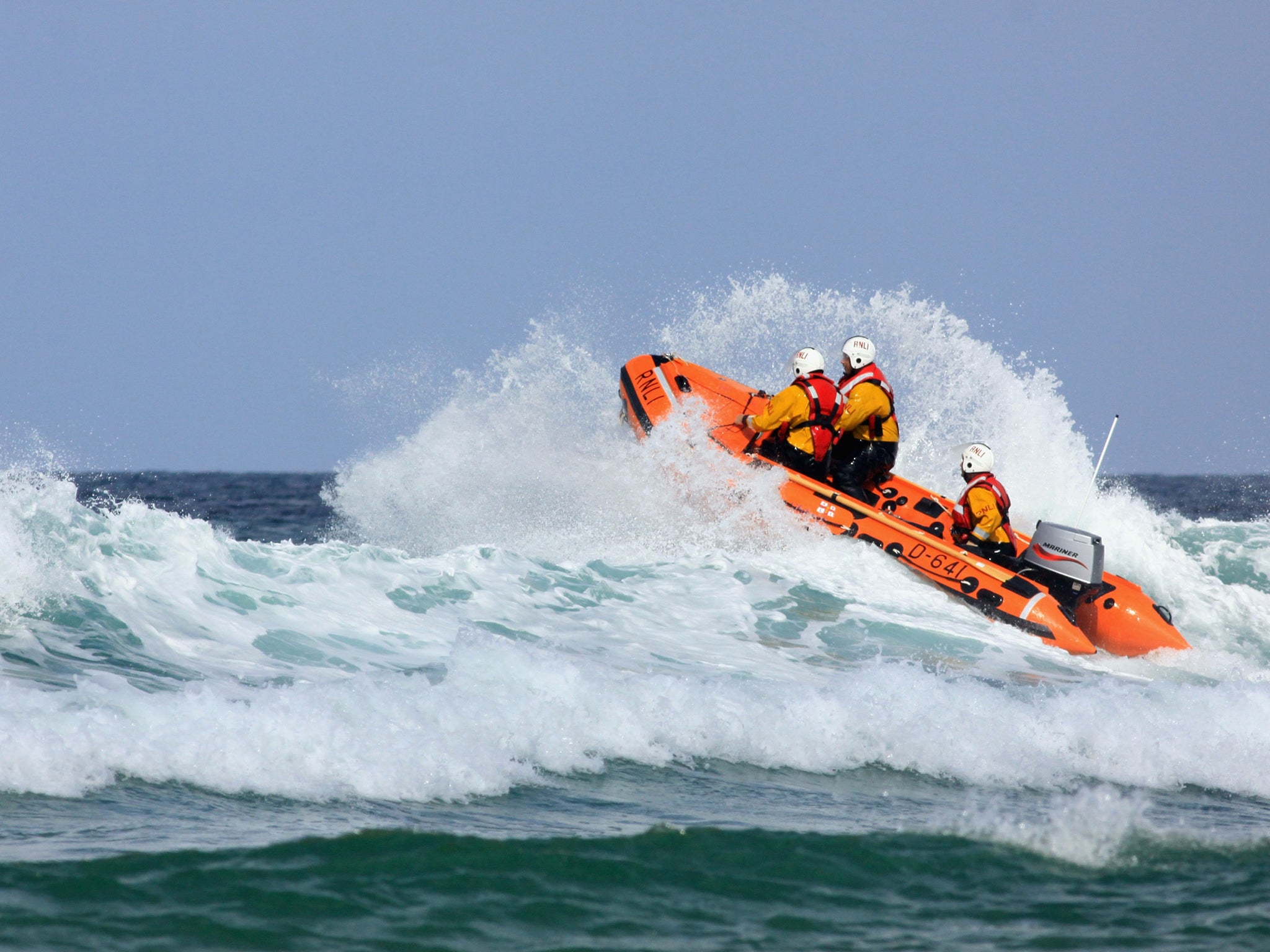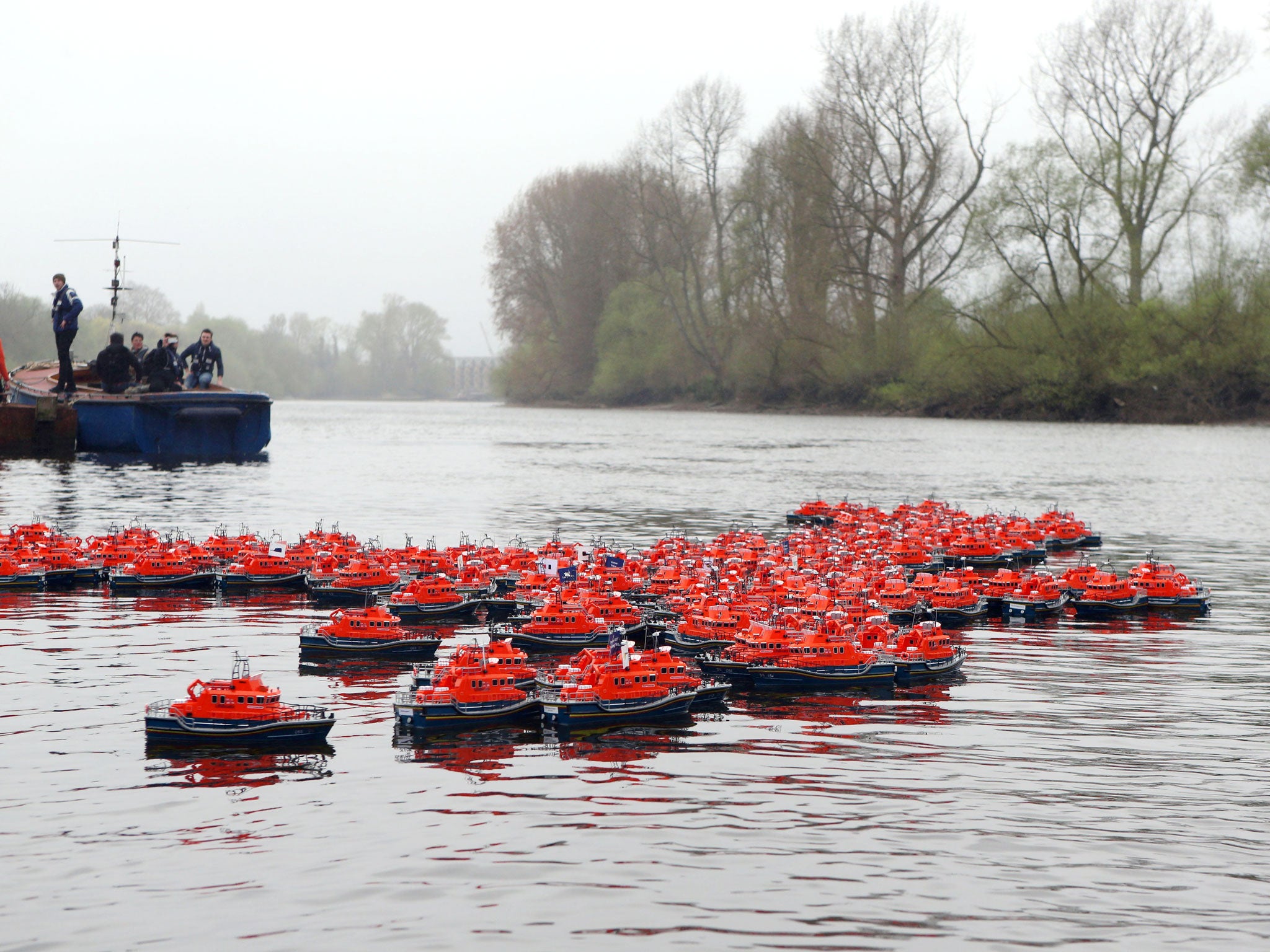Lifeboat crews saved 460 last year: 'If it were not for them I would not be speaking to you'
As families head for the beach, the RNLI reminds us of the power of the sea

The waves were huge. They were smashing against a high breakwater, exploding into the air and swamping the footpath at Sprey Point, near Dawlish in Devon. Still, Marcus Paz and his friend thought it would be fun to run along the top of the concrete wall, trying to dodge the breakers. “I was arrogant,” says Marcus, who was 16 at the time. “I thought I was invincible and nothing could ever happen to me. I was wrong.”
Marcus looked to his left on that bitterly cold December afternoon, with the light fading fast, and saw a terrifying mass of water coming towards him that was even bigger than the others. “There was nothing I could do. The first massive wave picked me up off my feet then smashed me against the wall and dragged me out to sea. Then a second wave smashed me against the wall again, and I hit my head, badly.”
Now he was caught in the vicious cycle of the waves turning under the wall. Marcus was a surfer and knew that if he didn’t get out of there fast he would die. “I had no chance of climbing out, so my only choice was to swim out to sea.” But the current was too strong and his body was shutting down. His limbs were going numb as blood was diverted to his organs. “You think, ‘Is this my time? I’m never going to see my mum, my brother or my sister again.’
And that is where the story ends for some people.
Last year, there were 163 deaths in British waters, according to figures released by the Royal National Lifeboat Institution (RNLI). That’s more than were killed cycling on the roads. Surprisingly, more than half of those who drowned had not intended to be in the water. They were walking, running or climbing along the shoreline or in boats. They slipped, tripped or fell. Lifeboat crews saved 460 people in 2014.
The charity has launched a hard-hitting campaign called Respect The Water, aimed at halving the number of deaths by getting the message across that apparently safe British and Irish waters can be dangerously unpredictable. Two shocking short films are being shown in cinemas all over the country and they take your breath away, almost literally.
One shows what it is like to drown, trying to call out to your friends but being sucked under the water again and again until you stop struggling. The other challenges the viewer to see how long they can hold their breath, at the same time as watching someone flail and die. “In the water, you might not last 10 seconds.” It’s frightening stuff.

Perhaps the most startling fact is that the temperature in every river and stretch of sea in Britain is low enough – at an average of 12C – to cause a reaction that kills. The Thames has four lifeboat stations; of these, Tower has the fastest boat in the RNLI fleet – with 500 call-outs a year, it needs it
“Cold-water shock can stop the heart no matter how fit you are, then steal the air from your lungs so you can’t cry for help,” says the RNLI. “The cold can paralyse your limbs in minutes, as the blood moves to your organs to keep them warn. And even if you’re a strong swimmer you can drown just a few metres from safety. Knowing the unpredictability of water could save your life.”
Rip currents can quickly drag you down or away. Fighting them is exhausting, as Marcus Paz found when the wave swept him off the breakwater in December 2009. But he was lucky. The wave cycle brought him back to the surface and as he gulped in air he saw what felt like a miracle. The four-man lifeboat from Teignmouth RNLI station was gunning towards him. A young couple had seen him go into the sea and called the emergency services.
“If it were not for the lifeboat I would not be speaking to you,” says Marcus, now 22. The crew dragged him aboard at the third attempt, then hit trouble themselves. “A wave came and the boat was vertical, we were dragged down towards the engine.” They made it to shore and an ambulance got him to Torquay hospital, where doctors scanned his lungs for any traces of water which might cause secondary drowning. “You can drown at any moment in the following 72 hours,” says Marcus, who now works as a lifeguard.
Six months ago, he joined the crew of the lifeboat that saved him. “The nightmares I still have are made worse by knowing that I put the lives of those four men in danger, but they welcomed me to the crew with open arms. I think they are inspiring.”
Lifeboat crews tend not to get the attention they deserve, because Britain has largely turned its back on the sea. The Navy is a fraction of its former self, so is the fishing fleet. The waters that were once our main highways are often forgotten about, unless we see them on our holidays. And yet surveys show that for millions of landlocked Britons the pull of the sea is still strong.
Personally, I followed that pull out of London and down to the south coast more than a decade ago and have never regretted it (however much Southern Rail tries to make me). The attraction feels primal. We are mostly made of water, we cannot live without it and the sea is where we came from, back before time.
Resting our eyes on the horizon and hearing the lap of waves makes us calm. The seascape reminds us of our place in the scale of things.
We do still love to be beside the seaside, but the sea returns our love with cruelty because we underestimate its power, says Paul Legendre, coxswain of the lifeboat in Newhaven, East Sussex. “That’s where we come in. If there is bad weather and all the boats are coming in, then we will be going out to help someone.”
This 53-year-old is weatherbeaten. He has the piercing eyes and haunted look of a man who has seen terrible things. His boat recovers the bodies of those who jump from the cliffs at Beachy Head, for example. Mr Legendre – Legend to his mates – once had to leap from a sinking trawler. He cracked his ribs jumping like a starfish on to the deck of a yacht in a storm, to try to save the crew.
As the only full-time professional lifeboatman at Newhaven he is coming to the end of three weeks continuously on call and is knackered. “Doesn’t matter though, the pager could go any minute.”

The Severn-class lifeboat is the biggest in the RNLI fleet. It takes seven crew, including in this case a plumber, a couple of builders and an accountant. They aim to be at sea within five to seven minutes of a call, day or night. “Even on a lovely day like this there is a potential for death,” says Mr Legendre as the sun beats down and the sky rages blue. “Somebody could be walking their dog and slip, maybe hit their head. The tide could come in. Then it’s too late for that person.”
Some boat owners are not too clever and don’t look up the weather, check their engines or take the proper gear. “You see boats go out with a whole family in them, and the only one wearing a lifeboat is the dog.”
For all his experience, there is one shout that nearly broke his heart. Dylan Alkins was a 14-year-old boy playing on West Beach in Newhaven with his mates on a Sunday afternoon in October 2013, as the St Jude storm approached.
“We had gone to watch the waves,” said his friend Paige Skinner, also 14 at the time. “Dylan was standing about 15 metres from the sea. He wasn’t swimming like everyone said, he isn’t stupid. We turned to look towards Peacehaven at the waves and when I turned around there was a massive wave. It must have been 20ft, and it came over the top of him and pulled him into the sea.”
The wind was at Storm Force 10 but Paul Legendre steered his lifeboat as close as possible to the western breakwater as his crew peered into the churning waters. He kept it there for six exhausting hours, even after all hope of rescuing Dylan had gone. “We wanted to recover the body, for the family.” A helicopter coastguards on shore, and two other boats were also searching.
“To launch into such conditions with darkness approaching takes great skill and courage,” said George Rawlinson, director of operations for the RNLI, giving him a commendation. “The seamanship Paul displayed was second to none, and the concentration required to hold the lifeboat in position in shallow waters and breaking waves was intense.”

The body was never found. “With children, it is terrible,” says Mr Legendre. “That job, to this day, fills the back of my eyes up.” If you are the praying kind, remember him and the crews today, the first Sunday of the school summer holidays. If not, remember them anyway.
Already this year the Newhaven crew has recovered the bodies of three teenagers who went swimming in the night after drinking. “People do not respect the water. We all think we’re superman when we’ve had a couple of drinks, but …” Paul Legendre shakes his head and rubs his tired, lined face with both hands, before looking up with those intense, sea green eyes and saying the thing that all lifeboat men and women want us to hear today.
“You’re not going to beat the sea. Just be careful.”
Join our commenting forum
Join thought-provoking conversations, follow other Independent readers and see their replies
Comments
Bookmark popover
Removed from bookmarks